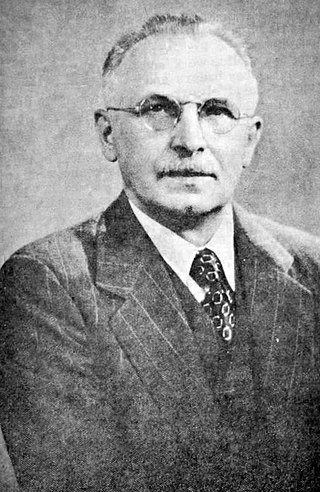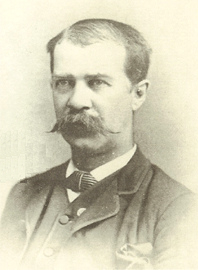Anarchism is a political philosophy and movement that is against all forms of authority and seeks to abolish the institutions it claims maintain unnecessary coercion and hierarchy, typically including the state and capitalism. Anarchism advocates for the replacement of the state with stateless societies and voluntary free associations. As a historically left-wing movement, this reading of anarchism is placed on the farthest left of the political spectrum, usually described as the libertarian wing of the socialist movement.
Individualist anarchism is the branch of anarchism that emphasizes the individual and their will over external determinants such as groups, society, traditions, and ideological systems. Although usually contrasted with social anarchism, both individualist and social anarchism have influenced each other. Mutualism, an economic theory sometimes considered a synthesis of communism and property, has been considered individualist anarchism and other times part of social anarchism. Many anarcho-communists regard themselves as radical individualists, seeing anarcho-communism as the best social system for the realization of individual freedom. Some anarcho-capitalists claim anarcho-capitalism is part of the individualist anarchist tradition, while others disagree and claim individualist anarchism is only part of the socialist movement and part of the libertarian socialist tradition. Economically, while European individualist anarchists are pluralists who advocate anarchism without adjectives and synthesis anarchism, ranging from anarcho-communist to mutualist economic types, most American individualist anarchists of the 19th century advocated mutualism, a libertarian socialist form of market socialism, or a free-market socialist form of classical economics. Individualist anarchists are opposed to property that violates the entitlement theory of justice, that is, gives privilege due to unjust acquisition or exchange, and thus is exploitative, seeking to "destroy the tyranny of capital, — that is, of property" by mutual credit.
Anarchist communism is a political philosophy and anarchist school of thought that advocates communism. It calls for the abolition of private property but retention of personal property and collectively-owned items, goods, and services. It supports social ownership of property and the distribution of resources "From each according to his ability, to each according to his needs".

Syndicalism is a revolutionary current within the labour movement that, through industrial unionism, seeks to unionize workers according to industry and advance their demands through strikes, with the eventual goal of gaining control over the means of production and the economy at large through social ownership. Developed in French labor unions during the late 19th century, syndicalist movements were most predominant amongst the socialist movement during the interwar period that preceded the outbreak of World War II.
Anarcho-syndicalism is a political philosophy and anarchist school of thought that views revolutionary industrial unionism or syndicalism as a method for workers in capitalist society to gain control of an economy and thus control influence in broader society. The goal of syndicalism is to abolish the wage system, regarding it as wage slavery. Anarcho-syndicalist theory generally focuses on the labour movement. Reflecting the anarchist philosophy from which it draws its primary inspiration, anarcho-syndicalism is centred on the idea that power corrupts and that any hierarchy that cannot be ethically justified must be dismantled.

Grigorii Petrovich Maksimov was a Russian anarcho-syndicalist. From the first days of the Russian Revolution, he played a leading role in the country's syndicalist movement – editing the newspaper Golos Truda and organising the formation of factory committees. Following the October Revolution, he came into conflict with the Bolsheviks, who he fiercely criticised for their authoritarian and centralist tendencies. For his anti-Bolshevik activities, he was eventually arrested and imprisoned, before finally being deported from the country. In exile, he continued to lead the anarcho-syndicalist movement, spearheading the establishment of the International Workers' Association (IWA), of which he was a member until his death.
The history of anarchism is ambiguous, primarily due to the ambiguity of anarchism itself. Scholars find it hard to define or agree on what anarchism means, which makes outlining its history difficult. There is a range of views on anarchism and its history. Some feel anarchism is a distinct, well-defined 19th and 20th century movement while others identify anarchist traits long before first civilisations existed.
Anarchism in the United States began in the mid-19th century and started to grow in influence as it entered the American labor movements, growing an anarcho-communist current as well as gaining notoriety for violent propaganda of the deed and campaigning for diverse social reforms in the early 20th century. By around the start of the 20th century, the heyday of individualist anarchism had passed and anarcho-communism and other social anarchist currents emerged as the dominant anarchist tendency.

The Cause of Labor was a libertarian communist magazine published by exiled Russian and Ukrainian anarchists. Initially under the editorship of Peter Arshinov, after it published the Organizational Platform, the subsequent controversy resulted in his exit from the anarchist movement. The magazine was then picked up by Grigorii Maksimov, who moved it to the United States and edited it until his death in 1950.

Dyer Daniel Lum was an American anarchist, labor activist and poet. A leading syndicalist and a prominent left-wing intellectual of the 1880s, Lum is best remembered as the lover and mentor of early anarcha-feminist Voltairine de Cleyre.
The following outline is provided as an overview of and topical guide to anarchism:

Golos Truda was a Russian-language anarchist newspaper. Founded by working-class Russian expatriates in New York City in 1911, Golos Truda shifted to Petrograd during the Russian Revolution in 1917, when its editors took advantage of the general amnesty and right of return for political dissidents. There, the paper integrated itself into the anarchist labour movement, pronounced the necessity of a social revolution of and by the workers, and situated itself in opposition to the myriad of other left-wing movements.

Black Flame: The Revolutionary Class Politics of Anarchism and Syndicalism is a book written by Lucien van der Walt and Michael Schmidt that deals with "the ideas, history and relevance of the broad anarchist tradition through a survey of 150 years of global history." The book includes a preface by Scottish anarchist and former political prisoner Stuart Christie.
Synthesis anarchism, also known as united anarchism, is an organisational principle that seeks unity in diversity, aiming to bring together anarchists of different tendencies into a single federation. Developed mainly by the Russian anarchist Volin and the French anarchist Sébastien Faure, synthesis anarchism was designed to appeal to communists, syndicalists and individualists alike. According to synthesis anarchism, an anarchist federation ought to be heterogeneous and relatively loosely-organised, in order to preserve the individual autonomy of its members.
A general strike is a strike action in which participants cease all economic activity, such as working, to strengthen the bargaining position of a trade union or achieve a common social or political goal. They are organised by large coalitions of political, social, and labour organizations and may also include rallies, marches, boycotts, civil disobedience, non-payment of taxes, and other forms of direct or indirect action. Additionally, general strikes might exclude care workers, such as teachers, doctors, and nurses.
Platformism is an anarchist organizational theory that aims to create a tightly-coordinated anarchist federation. Its main features include a common tactical line, a unified political policy and a commitment to collective responsibility.
Collectivist anarchism, also called anarchist collectivism and anarcho-collectivism, is an anarchist school of thought that advocates the abolition of both the state and private ownership of the means of production. In their place, it envisions both the collective ownership of the means of production and the entitlement of workers to the fruits of their own labour, which would be ensured by a societal pact between individuals and collectives. Collectivists considered trade unions to be the means through which to bring about collectivism through a social revolution, where they would form the nucleus for a post-capitalist society.
To the Workingmen of America, known as the Pittsburgh Manifesto or Pittsburgh Proclamation, is an anarchist manifesto issued at the October 1883 Pittsburgh Congress of the International Working People's Association. After the organization faded, the manifesto remained generally accepted by American anarchists as a clear articulation of their beliefs.
Abram Solomonovych Grossman (1879–1908) was a Ukrainian Jewish anarchist revolutionary. Initially a social democrat, he went into exile for his political activities and became radicalised towards revolutionary socialism. After a short stint in the SR Combat Organization, he was imprisoned and again fled into exile, where he moved towards anarchist communism. In the pages of Burevestnik, he took a fiercely critical line against syndicalism and rationalism, instead advocating terrorism and empiricism respectively. Following the Russian Revolution of 1905, he returned to Ukraine a final time in order to establish an anarchist communist "battle detachment", but he was shot by police before he could carry out his plans.
Yakov Isaevich Kirilovskii, commonly known by his pseudonym Daniil Novomirskii, was a Ukrainian Jewish anarcho-syndicalist. A leading figure in the Ukrainian syndicalist movement, Novomirskii sharply criticised the terrorist tactics of anarchist communism and the opportunism of social democracy. His South Russian Group of Anarcho-Syndicalists grew in popularity among workers throughout Ukraine, but it was suppressed in the aftermath of the 1905 Revolution and Novomirskii himself was imprisoned. After the 1917 Revolution, he became a notable anarchist supporter of the Russian Communist Party, although he was later disillusioned by its implementation of the New Economic Policy. He and his wife disappeared into the Gulag during the Great Purge.






